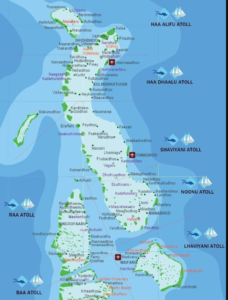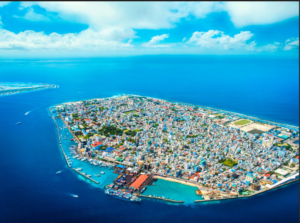Overview

India and Maldives are currently in discussions to find practical solutions that would allow the continued use of Indian military platforms in the Maldives. The new government in the Maldives has officially requested India to withdraw its military presence from the country. In response, Union Minister Kiren Rijiju met with Mohamed Muizzu, the newly inaugurated President of the Maldives, and reassured him of India’s commitment to strengthening bilateral cooperation and fostering strong ties between the people of the two nations.
President Muizzu, who had promised during his campaign to remove Indian military personnel from the Maldives, has stated that he plans to achieve this through diplomatic means. The presence of Indian military personnel in the Maldives, who operate aircraft for medical evacuations and counter drug trafficking, was a topic of discussion during the meeting.
The condition like such is occurred between the two nation is first time since 1965.
The recent meeting

Prime minister Narender Modi and President Muizzu held a talk in the COP28summit in Dubai. it was said that the issues are figured and understood. The sources said that the issues have been figured in the discussion in Dubai. After the meeting between Modi and Muizzu, the Ministry of External Affairs (MEA) said that the two leaders also talked about ways to strengthen their partnership even more, and they agreed to create a core group to work on this. Sources also mentioned that the Maldivian side has recognized the value of Indian military equipment.

The need of both the countries needs to be discussed and looked from all the prospectives. After their meeting, Modi and Muizzu discussed ways to further strengthen their partnership and decided to form a core group to work on this. They also talked about the importance of Indian military equipment in their bilateral development partnership, and both sides are working on ways to keep them operational. The source mentioned that the core group will focus on the details of moving forward with this plan.
Both governments agreed to explore practical solutions for continued cooperation through the use of these platforms, as it is in the best interest of the people of the Maldives. The Maldives, being one of India’s key maritime neighbors in the Indian Ocean Region, has seen an upward trend in overall bilateral ties, including in areas of defense and security, over the past few years. The Maldives is also one of the largest beneficiaries of India’s Neighborhood First policy.
Currently in Maldives

There are 77 Indian military personnel stationed in the Maldives. The new government is in the process of reviewing over 100 agreements that have been signed with New Delhi. These personnel include 24 individuals managing the first helicopter, 25 managing the Dornier aircraft, 26 managing the second helicopter, and two additional personnel for maintenance and engineering. The new administration has confirmed that there are 77 Indian military personnel in the Maldives.
INDIA-MALDIVES AND CHINA.
Chain has always been India’s revel whether it is in labor population or another eco-political issues.
China has been playing a significant and complex role in the dynamics between India and the Maldives. Over the past decade, China has strategically integrated the Maldives into its Indo-Pacific plans, extending its influence on the island nation through diplomatic channels and aid.

As China’s presence in the Maldives grows, particularly with infrastructure projects like the China-Maldives Friendship Bridge, it has raised eyebrows in India. India traditionally views the region as part of its sphere of influence, and the escalating geopolitical competition between India and China is clearly visible in the infrastructure development race in the Maldives.
During the tenure of former Maldivian President Abdulla Yameen, the Maldives leaned towards Beijing, receiving substantial Chinese funds for the development of its coral islands. However, Yameen’s unexpected defeat in the late 2018 elections provided India with an opportunity to repair relations with its traditional ally.
China’s foray into the Maldives is perceived as a strategic move to further its own interests. It has done so through debt financing, leading to debt traps and consequent dominance of China. China’s policy of meddling in the internal politics and backing conservative elements in the Maldives could potentially hinder the growth of a vibrant democracy in the Maldives.

In a nutshell, China’s involvement in the India-Maldives relationship has added a new layer of complexity to the dynamics of this relationship. It’s a delicate balance that both India and the Maldives have to carefully navigate.
China’s ambitions to establish hegemony in the Indian Ocean Region (IOR) pose a potential threat to the development of a vibrant democracy in the Maldives. Which can lead to the strong ports of China in the countries like Pakistan, Maldives and SriLankan. Chaina is going too far in Indian ocean and that is not looking like a positive sign and the Neighbors of India especially in Indian ocean can be a target of China government to take over the region of Indian ocean.












Comments 1